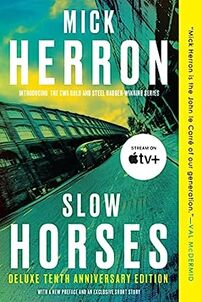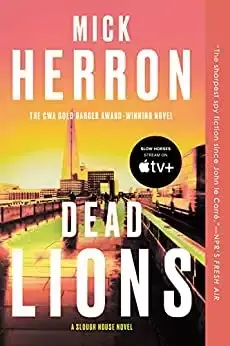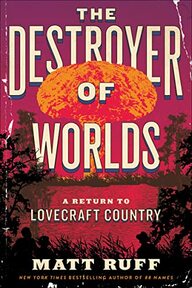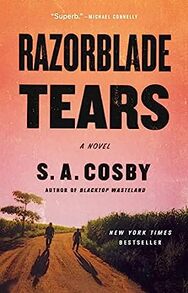
When I started watching the Apple TV show, Foundation, I , to my shame, had to admit that I had never read any of Isaac Asimov's Foundation books. It made me feel vaguely sci-fi illiterate.
I suspect the reason I didn't read them is that somewhere in the back of my mind I thought "Russian....Solzhenitsyn...Dostoevsky, pain, rewarding pain but pain" or something like that. Of course I know Asimov basically grew up in the USA but he is still Russian. I think it also may be a certain antipathy toward the "big three" Science Fiction writers. I find Robert Heinlein close to unreadable in style and in the dated view of what the future would bring. I've tried to read several of his books and abandoned them all. Top off the dated beatnik in space vibe of something like "A Stranger in a Strange Land" with some of his truly fascist inspired writings and I'm pretty much out. He at least HAS female characters in his work.
I have nothing against Arthur C. Clarke I suppose. I like a few of his books but I never did the "I must read them all" thing I usually do with a writer I love.
Foundation? Made me want to read all the books. Sure it is dated, like Heinlein, but not NEARLY on the same level. It is vaguely amusing to read what a writer and scientist like Asimov thought the distant future of humanity might hold, even in a fictional world. People still read newspapers and smoke a lot of cigars. There is nary a woman in any position of authority (occasionally a woman pops up as a "harpy").
The book covers a lot of time and numerous characters and is written like a series of short stories. In some cases these books were basically that, if I understand the history. I haven't delved too much into that because there is a whole....FOUNDATION dedicated to Asimov and I have little to add to the study of his writing. Oddly I felt like I was reading a science fiction Don Quixote with the unifying character being the spectral figure of Hari Seldon.
Asimov does what great fantasy and science fiction writers do, he creates a distinct world, a universe that is almost a character on its own. You can make a case that the universe matters more than any actual character. The television show has little to do with the books, aside from being set in the universe where characters have the same names but in a strange way it remains somehow true to the universe (if that makes sense). I have read other BOOKS by Asimov like I, Robot and it this may lead me to going crazy.
These books are the template that later science fiction writers built their careers on. Frank Herbert? I am looking at YOU! Herbert's Dune universe is quite similar to Asimov's even if the story is wildly different. Sure Dune spans a massive amount of time as it goes on but it is a narrower group of characters. It is also one of those series where each successive book is about half as good as the previous book (fortunately the first book is GREAT). Herbert is not alone in using Asimov as a building block.
I've only read book one, Foundation, but I do feel the need to read the rest and even if the axiom I suggest above for Dune is true here? I will probably get through all of them. Some older books are history, you read them as that but this book is more than that. It is an enjoyable read and, even now, is unique and inimitable.
I suspect the reason I didn't read them is that somewhere in the back of my mind I thought "Russian....Solzhenitsyn...Dostoevsky, pain, rewarding pain but pain" or something like that. Of course I know Asimov basically grew up in the USA but he is still Russian. I think it also may be a certain antipathy toward the "big three" Science Fiction writers. I find Robert Heinlein close to unreadable in style and in the dated view of what the future would bring. I've tried to read several of his books and abandoned them all. Top off the dated beatnik in space vibe of something like "A Stranger in a Strange Land" with some of his truly fascist inspired writings and I'm pretty much out. He at least HAS female characters in his work.
I have nothing against Arthur C. Clarke I suppose. I like a few of his books but I never did the "I must read them all" thing I usually do with a writer I love.
Foundation? Made me want to read all the books. Sure it is dated, like Heinlein, but not NEARLY on the same level. It is vaguely amusing to read what a writer and scientist like Asimov thought the distant future of humanity might hold, even in a fictional world. People still read newspapers and smoke a lot of cigars. There is nary a woman in any position of authority (occasionally a woman pops up as a "harpy").
The book covers a lot of time and numerous characters and is written like a series of short stories. In some cases these books were basically that, if I understand the history. I haven't delved too much into that because there is a whole....FOUNDATION dedicated to Asimov and I have little to add to the study of his writing. Oddly I felt like I was reading a science fiction Don Quixote with the unifying character being the spectral figure of Hari Seldon.
Asimov does what great fantasy and science fiction writers do, he creates a distinct world, a universe that is almost a character on its own. You can make a case that the universe matters more than any actual character. The television show has little to do with the books, aside from being set in the universe where characters have the same names but in a strange way it remains somehow true to the universe (if that makes sense). I have read other BOOKS by Asimov like I, Robot and it this may lead me to going crazy.
These books are the template that later science fiction writers built their careers on. Frank Herbert? I am looking at YOU! Herbert's Dune universe is quite similar to Asimov's even if the story is wildly different. Sure Dune spans a massive amount of time as it goes on but it is a narrower group of characters. It is also one of those series where each successive book is about half as good as the previous book (fortunately the first book is GREAT). Herbert is not alone in using Asimov as a building block.
I've only read book one, Foundation, but I do feel the need to read the rest and even if the axiom I suggest above for Dune is true here? I will probably get through all of them. Some older books are history, you read them as that but this book is more than that. It is an enjoyable read and, even now, is unique and inimitable.




 RSS Feed
RSS Feed